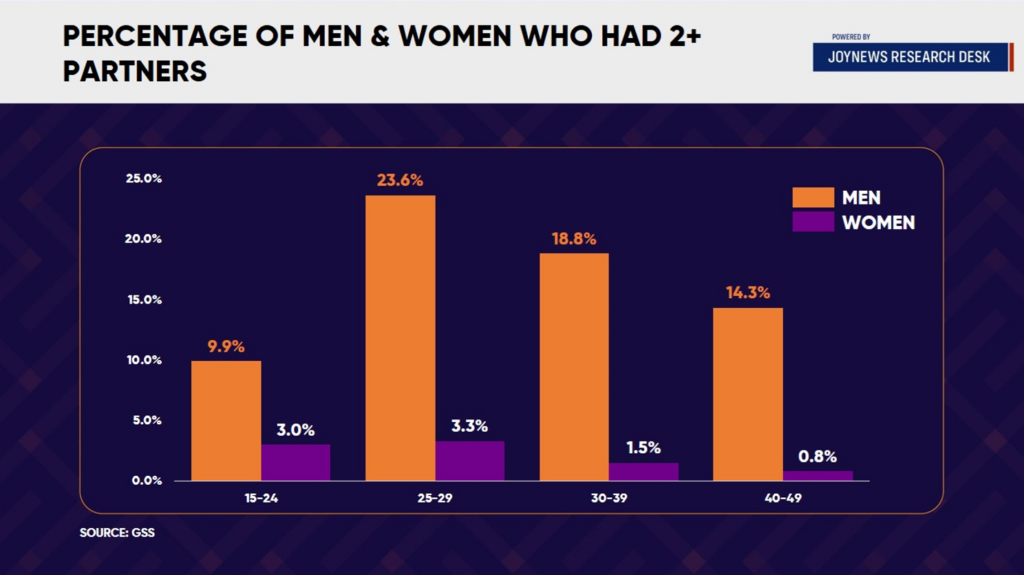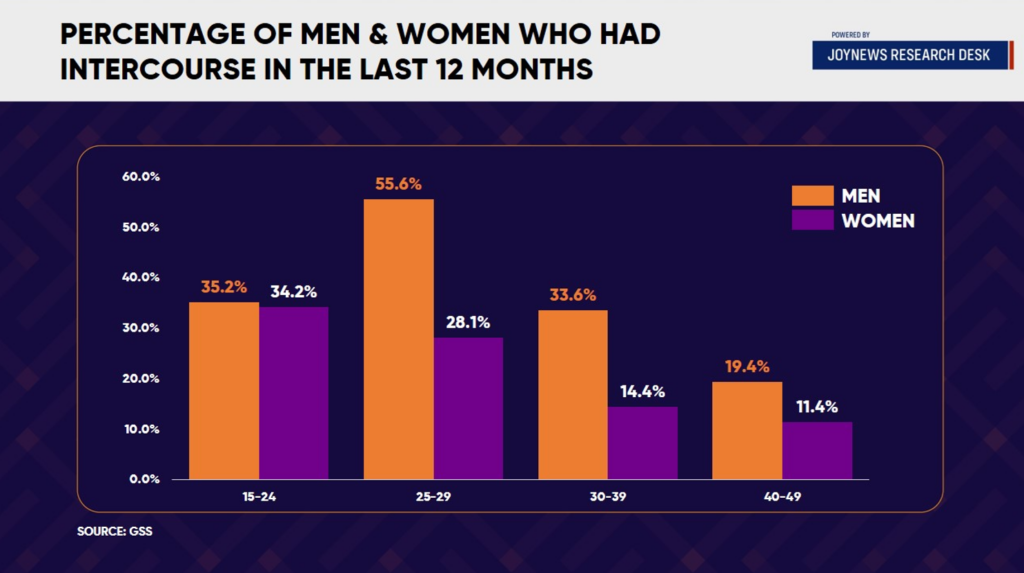Sex is a generally controversial topic. The situation becomes even more sensitive when discussing it in Ghana, where families traditionally avoid public conversations on the matter.
However, the numbers provided by the Ghana Statistical Service in its 2022 Ghana Demographic and Health Survey offer a stark revelation about what was previously seen as a 'no-go' area.
The survey, among others, explores various aspects of multiple sexual behaviors, including partners, contraception, extra-marital affairs, and regional differences, providing valuable information on a subject that has long been kept in the shadows.
The study outlined insight into the sexual trend of Ghanaians between the ages of 15 and 49.
- Read also: Contraceptive usage: Urban married women most likely to opt for ‘withdrawal method’ – GSS report
The rest of the article provides information, infographics, and links that put the 65-page document into perspective.
The 2022 Ghana Demographic and Health Survey has revealed that two in every 10 married Ghanaian men have skipped the marital bed for some extramarital frolicking.

According to the survey, 17.5% of married men in Ghana have two or more partners who are not their wives.
And 18.4% of married men have had sexual intercourse with persons who are not their wives.
Also, 18.7% of divorced /separated/widowed men in Ghana have two or more partners and 69.9% have had sexual intercourse with persons who are neither their wives.
Meanwhile, about 10% of men aged 15-24 have two or more partners, 35.2% have had sexual intercourse with persons who are neither their wives.

In a related development, the Report also found that 80% of females aged 15-24 have sex without condoms.
This is despite 79% of young women being aware that the consistent use of condoms can reduce the risk of getting HIV, according to the survey.
As of 2022, the Ghana AIDS Commission indicated that females account for two-thirds of total new HIV infections in Ghana.

Out of the total 16,574 new HIV infections recorded in Ghana in the 2022 National and Sub-National HIV/AIDS estimates and projections, females accounted for 10,927 of the cases while males accounted for 5,647.
Apparently, urban married women like to use the 'pullout' method of contraception more than rural married women.

Higher education and sexual partners
The study also found that higher education may be the key to improving your sexual desirability – for men.

The 2022 Ghana Statistical Service’s Ghana Demographic and Health Survey report has revealed that as men scale up the academic ladder the probability of them having more sexual partners is higher.
For instance, amongst uneducated men, 14.5% had more than two partners, while 18.6% of them had sex with a person who was neither their wife nor lived with them.

Amongst men who had terminated their education at the primary level, 14.9% had more than two partners, while 29.9% of them had sex with a person who was neither their wife nor lived with them.
Amongst secondary school graduates, the number inches even higher with 15.1% of men having more than two partners, while 36.1% had sex with a person who was neither their wife nor lived with them.

Finally, 15.4% of men who have attained higher education i.e. tertiary level had more than two partners, while four out of 10 men (41.8%) had sex with a person who was neither their wife nor lived with them.
The reverse is true for women.
The survey reveals women relatively have fewer sexual partners the higher their education level.

For instance, amongst uneducated women, only 1.0% had more than two partners, while 6.9% had sex with a person who was neither their husband nor lived with them.
Amongst women who had only basic (primary level) education, 2.8% had more than two partners, while 21.5% had sex with a person who was neither their husband nor lived with them.
Amongst secondary school graduates, the percentage of people who had more than two partners drops to 2.4%, while 27.3% had sex with a person who was neither their husband nor lived with them.
Contraception
According to the 2022 Ghana Demographic and Health Survey carried out by the Ghana Statistical Service, the use of a traditional method of contraception in Ghana is higher in urban areas (10%) than in rural areas (7%).

Traditional methods of contraception include periodic abstinence or rhythm method (of any kind), withdrawal, and lactational amenorrhea.
The modern methods of contraception include: oral contraceptive pills, implants, injectables, contraceptive patches and vaginal rings, intrauterine devices (IDU), female and male condoms, female and male sterilization, vaginal barrier methods (including the diaphragm, cervical cap and spermicidal agents), among others.
The study found that the use of a modern method of contraception among currently married women is slightly higher in rural areas than in urban areas (29%, versus 27%, respectively).

Among currently married women, injectables and implants are the most commonly used modern methods (8% each), followed by the pill (4%), and female sterilization (3%).
Overall, 36% of currently married women are using a method of contraception, 28% are using a modern method, and 9% are using a traditional method.
In a related development, the Report also found that the total demand for family planning among currently married women is 60%.
This demand consists of the 36% of currently married women who have a met need for family planning i.e. they are currently using a contraceptive method, and 23% of currently married women have an unmet need for family planning.
Latest Stories
-
Paris 2024: Opening ceremony showcases grandiose celebration of French culture and diversity
3 hours -
How decline of Indian vultures led to 500,000 human deaths
4 hours -
Paris 2024: Ghana rocks ‘fabulous fugu’ at olympics opening ceremony
4 hours -
Trust Hospital faces financial strain with rising debt levels – Auditor-General’s report
5 hours -
Electrochem lease: Allocate portions of land to Songor people – Resident demand
5 hours -
82 widows receive financial aid from Chayil Foundation
5 hours -
The silent struggles: Female journalists grapple with Ghana’s high cost of living
5 hours -
BoG yet to make any payment to Service Ghana Auto Group
5 hours -
‘Crushed Young’: The Multimedia Group, JL Properties surprise accident victim’s family with fully-furnished apartment
6 hours -
Asante Kotoko needs structure that would outlive any administration – Opoku Nti
6 hours -
JoyNews exposé on Customs officials demanding bribes airs on July 29
7 hours -
JoyNews Impact Maker Awardee ships first consignment of honey from Kwahu Afram Plains
8 hours -
Joint committee under fire over report on salt mining lease granted Electrochem
8 hours -
Life Lounge with Edem Knight-Tay: Don’t be beaten the third time
8 hours -
Pro-NPP group launched to help ‘Break the 8’
9 hours

